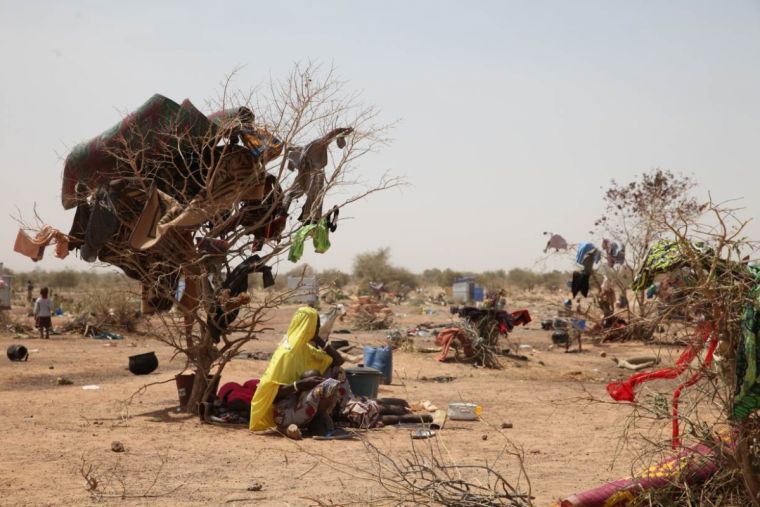Christians being killed 'without provocation' as violence returns to Burkina Faso

At least 19 people were killed in another attack in Burkina Faso on Sunday. Open Doors sources in the country believed the victims to be Christians.
Suspected jihadists carried out the attack in the district of Arbinda, in the north of the country.
A local official who asked to remain anonymous said that three vehicles had been stopped and set on fire, with one driver being killed, before several armed men opened fire on people in the town.
"Several dozen armed men carried out an attack on the district of Arbinda, shooting several people dead," the official said.
Another 13 people were injured in the attack, according to the government.
Open Doors said the grip of Islamic militants has been growing in the northern and eastern parts of Burkina Faso.
The government has failed to stem a wave of attacks on Christians in recent months. Several churches have been attacked during Sunday morning services, with priests among the victims.
The timing of the attack last Sunday was significant, as Christians across the country would have been heading out to church.
The bloodshed has continued in spite of heavy-handed measures on the part of the government. In mid-May 2019, the government began Operation Doofu in the Nord, Sahel, and Centre-Nord administrative regions to crack down on the rise in attacks by Islamist groups.
But Human Rights Watch says it has received reports of unlawful killings by both sides.
Corinne Dufka, the Africa Sahel region director at Human Rights Watch, recently said: "Government security forces and armed Islamist groups should be on notice that we are closely tracking alleged atrocities by both sides."
Burkina Faso used to have a reputation for peaceful coexistence between religious and ethnic groups, but after a revolution in 2014 brought down former President Blaise Compaoré after 27 years in power, Open Doors says extremist groups have worked to fill the power vacuum by "exploiting ethnic fault-lines and fanning ethnic strife".
An Open Doors worker said, "There are many factors contributing to the violence in Burkina Faso, including political, economic, tribal and religious reasons.
"Many Burkinabe youths have been radicalized by the teaching of Islamist preachers and leaders of extremist groups."
Human Rights Watch says the violence in the country is "reaching fever pitch" and that thousands have fled. It estimates that security forces have killed three times as many people as armed Islamist groups operating in the northern Sahel region, triggering the creation of "self-defence" militias and increased ethnic violence.
Christians have been caught up in the violence as many pastors and their families have been kidnapped and remain in captivity, while over 200 churches have closed in the north to avoid more attacks during Sunday worship, Open Doors reports.
The scale and speed of the deterioration has come as a huge shock to church leaders. They told Open Doors that they were not prepared for what has happened.
"This is the biggest shock of our lives as Christians. Never in our wildest imagination did we think this would happen and that today we would be left at the mercy of other believers in safer areas," Pastor Daniel Sawadogo told the charity.
"We have left everything we laboured for. Our children have been pushed out of school. Some of our men have been killed without provocation."
It is not only churches that have been forced to close their doors. According to Open Doors, hundreds of thousands of people are without access to medical care because health centres have either closed or scaled back their services due to the violence.
Many children are losing out on their education as thousands of schools remain closed, while jihadists are exploiting the situation.
One teacher told Open Doors, "The jihadists are replacing state schools with Arabic schools. We received severe warning to leave. The government succeeded in relocating some pupils and teachers to safer areas."
Churches are providing assistance, including food aid, to Christians displaced by the violence but they are struggling to keep up with the demand.
One Open Doors team member in the country, who cannot be named for security reasons, said the situation needs "urgent attention".
In addition to practical help, like food, clothing, and shelter, they said that Christians affected by the violence were in need of spiritual support like trauma care and prayer, and also needed discipleship training to learn how to "respond to this situation in a biblical way".
"The level of trauma among the displaced believers is extremely high, and they will live with it for a very long time if they are not helped," the Open Doors worker said.
Pastor Phillipe Bamogo told the charity that the church had survived through the revolution and would only grow stronger through this present crisis.
"During the revolution, the church was threatened by the state and experienced growth. So, the church will come out stronger than it is now," he said.
"Pain may endure for the night, but joy comes in the morning. We are suffering today, but our hearts are strong in the Lord. He will come to our rescue in due course."











